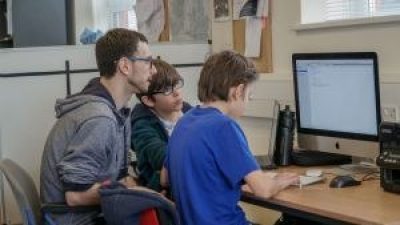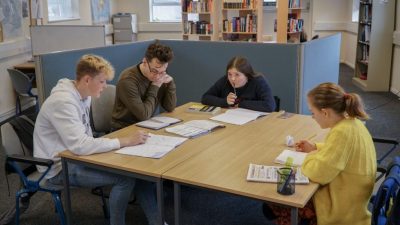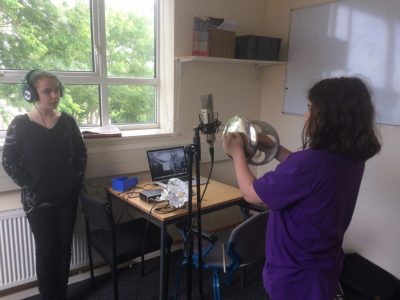Transformation into happy students


As a learning adviser at SML college I have been amazed by some of the personal transformations that have taken place in students since joining. One particular student anxious, low in confidence and motivation has in the space of 8 eight weeks, started their own project, developed a group of friends and had a complete shift in social interactions and body language. Another student, high in energy who struggled to fit into school, has developed tremendously in their confidence to communicate with others and has benefitted from being allowed the freedom to explore their own curiosity.
Because the College has such an emphasis on the individual wellbeing of each student, we have happy students who enjoy attending, and a happy student has a greater capacity to learn.
Joe Allen, Learning Adviser
Students following their own interests


At SML College because we don't have a forced curriculum, students are allowed to follow their own interests, which results in wonderful examples of creativity. These have included a range of projects on a variety of subjects such as hedgehogs, wild cats, technological impact in medicine and bughouse making, to name a few. Students have also recently started their own podcast and host a regular debate and discussion club where they bring up topics that are relevant to them. This element of freedom and ownership within the college has a positive impact on student wellbeing.
Students have said that:
"At the college, you get the chance to be the captain of your own learning"
"If I want to be pushed at SML I can be pushed, if I want to work independently, I can work independently, the environment suits where I am at"
"I learn to balance learning with play"
"I enjoy not having to wear a uniform, it allows me to express myself"
"I can actually be myself here"
by Joe Allen, Learning Adviser

Making a computer game


SMLG’ (Self Managed League Gaming) is a game creation project that has been supported by learning advisor Louis since March. Its goal is to create a small 2d platform game, made entirely by students on the team. There is a real range of skills between them, and it’s been brilliant to see them working together and filling in one another’s weaknesses.
It has been a slow process, but we now have a variety of gameplay experiments and prototypes, as well as a mass of excellent pixel art, sound effects (two things that none of the children had previously done) storyboarding/writing and music. It has been amazing to witness their enthusiasm over the game, and to collaborate effectively both inside college without any supervision or prompting and through an online program called ‘Discord’. The students each have one or more roles within the team, and have settled into their specialisations but have not been shy to try new things and help one another out.
Recently we had a rare opportunity to visit a professional games studio (Studio Gobo), which everyone found inspiring and fun. The students had a chance to hear from representatives from seven different departments, who gave great explanations of what their jobs were, the ins and outs of their roles and how they got into the industry. The group was extremely well-behaved and mature, and Studio Gobo said they would be happy for us to return.
The game is far from finished, we hope by the end of next term to have a fully functioning demo. One of the older students who is leaving SML College to go to FE College has stated that she would like to continue working on it over the summer, via Discord, which we all found very impressive and encouraging.

A discussion about education with comedian Mark Watson

I went to see the comedian Mark Watson doing a stand-up gig at a local club. One thing he likes is interacting with his audience. This time he left cards on tables for us to write on it any opinions we had individually that were seen as odd. I wrote that schooling should be abolished – this was a comedy gig and did need something controversial, even though I don’t hold to this in it’s extreme.
Mark comes on stage and picks out cards to read and one of these was mine. He asked who had written this and why did the person (me) think this. I asked him had he learned anything at school since he was 11 that he found useful on a daily basis. He couldn’t think of anything and, remember, he is an experienced performer who is excellent at responding quickly to his audience.
He then reversed the questioning and asked me if I did anything about this. I explained that we had a programme in the locality that was for young people aged 9-17 and it’s not a school and it has no curriculum, no imposed timetable and no classrooms. He challenged the legality of this saying that it’s the law that children go to school. He commented that getting his nine year-old to school was a problem but that he had to do it. I replied that it isn’t the law and that what we are doing is legal. He said that he would check this in the interval and come back after – and if he was right he’d report me to the authorities (I assumed that this was in jest).
He came back after the interval admitting that he had found out that I was correct and recognised that home education is legal. What’s interesting is;
1. He couldn’t answer my challenge.
2. That he – as a smart 40 year-old with two children - didn’t know the law. And possibly many of his audience were in the same position.
by Ian Cunningham
SML College is exactly what "teaching" should be
As a trainee teacher in mainstream education, I found teaching the subject I love, very difficult. The essence of learning is curiosity, expressiveness and freedom and unfortunately, the Science curriculum is being taught at young people instead of being engaged with, in an exciting and critical way. At SML, young people have the freedom to explore and inquire into a world where a lot of mystery is still to be revealed. I have the opportunity to help tutor students who want to study GCSE Science, coupled with providing fun workshops that cover a broader range of knowledge than the national curriculum does not always include. I also enjoy supporting students with CREST award projects. CREST is a UK award scheme that recognises success and enables students to build their skills and demonstrate personal achievement in project work. This involves students creating a project that they are interested in and conducting research and experiments as they explore.
SML College is exactly what "teaching" should be. Not lecturing a class of students who do not want to be there, but naturally encouraging, sparking imaginations and developing meaningful relationships with intrinsically motivated human beings. It's the future of education.
Joe Allen, Learning Adviser

